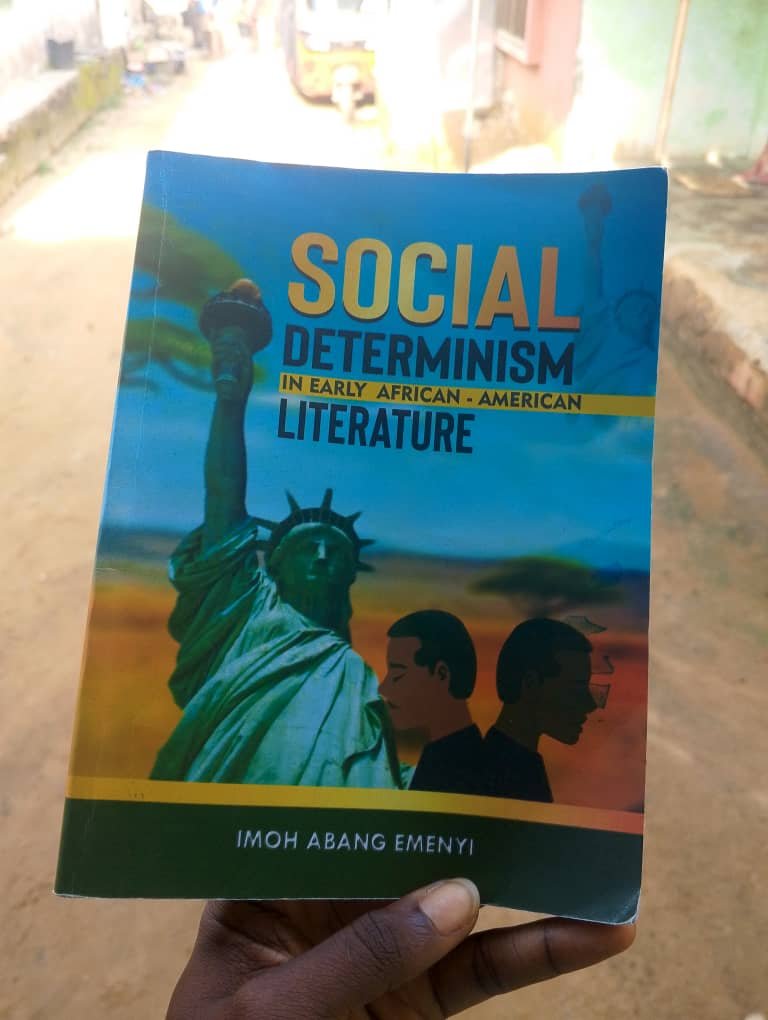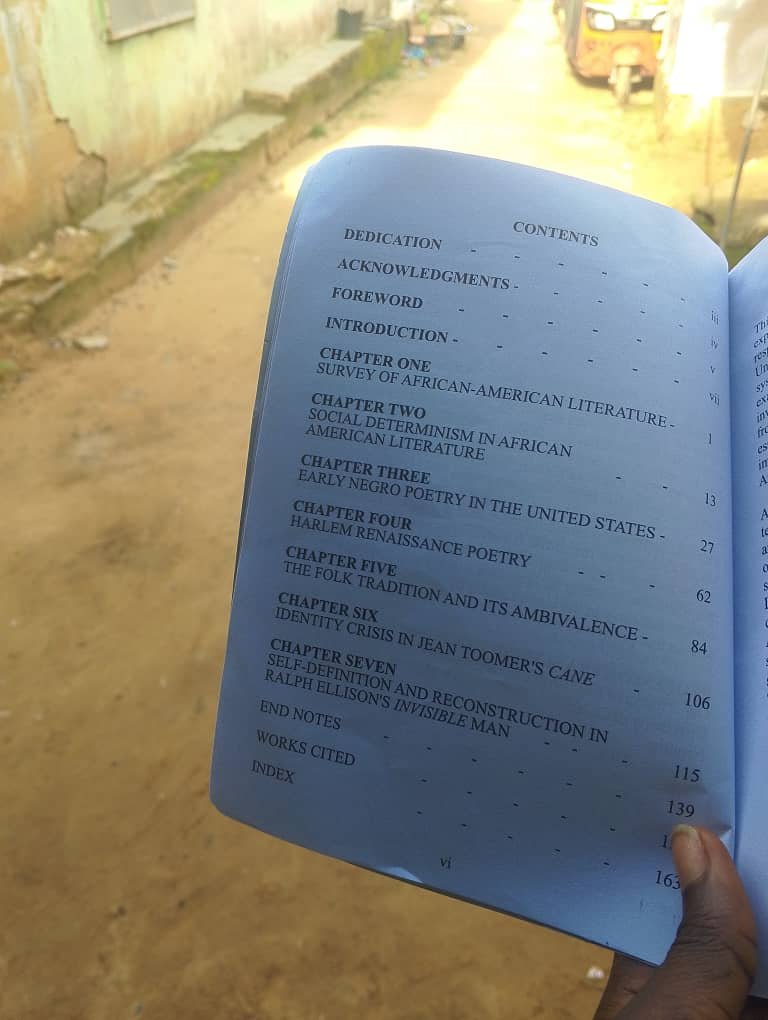Determinismo Social (Esp Eng) Social determinism.
Imoh Abang Emenyi’s Social Determinism in Early African American Literature is a deeply reflective and important work that explores how external forces such as race, class, gender, and the long shadow of slavery shaped the voices and experiences of early African American writers. The book takes a thoughtful look at how these writers were not just recording their stories, but also responding to the harsh realities of the world they lived in.
What makes this book powerful is the way it presents literature as a mirror of society. Emenyi shows that the early African American authors were writing from a place where their lives were largely dictated by a system that did not favor them. But rather than accept their conditions silently, they used their writing to push back, to speak out, and to reimagine their identities beyond the roles society had assigned them.
The book focuses on key figures such as Frederick Douglass, Harriet Jacobs, Charles Chesnutt, and W.E.B. Du Bois. Through close reading and analysis, Emenyi uncovers the ways these writers addressed the forces working against them. In Douglass’s case, his pursuit of education and freedom is portrayed not just as a personal journey but as a challenge to the system of slavery. Learning to read was more than an act of self-improvement it was an act of resistance.
Similarly, when Emenyi discusses Harriet Jacobs’s Incidents in the Life of a Slave Girl, she draws attention to how gender played a role in shaping the limits and possibilities of freedom. Jacobs had to navigate a deeply unfair world where even her resistance came at a heavy cost. The book highlights how she used her own voice to tell a story that had been silenced for too long.
One of the most interesting parts of the book is the section on the character type known as the "tragic mulatto." Emenyi explains how these characters, who often struggled to belong to either Black or white communities, served as a critique of society’s rigid racial divisions. Far from being simple or one-dimensional, they reflected the deep confusion and pain that resulted from a society obsessed with boundaries.
What stands out throughout the book is the sense of agency that Emenyi attributes to these writers. They were not helpless victims of their time. They were thinkers and fighters who used whatever tools they had to carve out a space for their truth. Their works were filled with pain, yes, but also with strength, creativity, and vision.
The writing style of the book is clear, focused, and thoughtful. It speaks to both students and general readers with interest in African American history, literature, or social justice. The ideas are presented in a way that feels like a conversation rather than a lecture, which makes the book both informative and engaging.
In all, Social Determinism in Early African American Literature invites readers to see how deeply literature is shaped by society and how writers used their words to challenge and reshape the world around them. Emenyi gives us a fresh perspective on familiar texts and reminds us of the power of the written word in the fight for dignity and equality. It is a book that deserves attention and respect, not only for its academic depth but for its human insight.




Determinismo Social
Determinismo Social en la Literatura Afroamericana Temprana de Imoh Abang Emenyi es una obra profundamente reflexiva e importante que explora cómo fuerzas externas como la raza, la clase social, el género y la larga sombra de la esclavitud moldearon las voces y experiencias de los primeros escritores afroamericanos. El libro ofrece una mirada cuidadosa a cómo estos autores no solo estaban registrando sus historias, sino también respondiendo a las duras realidades del mundo en el que vivían.
Lo que hace poderoso a este libro es la manera en que presenta la literatura como un reflejo de la sociedad. Emenyi demuestra que los primeros escritores afroamericanos escribían desde una posición en la que sus vidas estaban en gran parte determinadas por un sistema que no los favorecía. Pero en lugar de aceptar en silencio esas condiciones, usaron la escritura como una forma de resistencia, de expresión y de reconstrucción de sus identidades más allá de los papeles que la sociedad les había impuesto.
El libro se enfoca en figuras clave como Frederick Douglass, Harriet Jacobs, Charles Chesnutt y W.E.B. Du Bois. A través de lecturas detalladas y análisis profundos, Emenyi revela cómo estos autores enfrentaron las fuerzas que actuaban en su contra. En el caso de Douglass, su búsqueda de educación y libertad no se presenta solo como un viaje personal, sino como un desafío directo al sistema esclavista. Aprender a leer no era simplemente una mejora personal, sino un acto de resistencia.
De igual manera, al analizar Incidents in the Life of a Slave Girl de Harriet Jacobs, Emenyi resalta cómo el género influía en los límites y posibilidades de la libertad. Jacobs tuvo que enfrentarse a un mundo profundamente injusto, donde incluso su acto de resistencia implicaba grandes sacrificios. El libro destaca cómo ella usó su propia voz para contar una historia que había sido silenciada durante demasiado tiempo.
Una de las partes más interesantes del libro es la sección dedicada al tipo de personaje conocido como el “mulato trágico.” Emenyi explica cómo estos personajes, que a menudo luchaban por encontrar su lugar tanto en la comunidad negra como en la blanca, funcionaban como una crítica a las divisiones raciales estrictas de la sociedad. Lejos de ser figuras simples o superficiales, reflejaban una profunda confusión y dolor causados por una sociedad obsesionada con las fronteras raciales.
A lo largo del libro, destaca el sentido de agencia que Emenyi atribuye a estos escritores. No eran víctimas pasivas de su tiempo. Eran pensadores y luchadores que usaron las herramientas que tenían a su alcance para crear un espacio donde decir su verdad. Sus obras están llenas de dolor, sí, pero también de fuerza, creatividad y visión.
El estilo de escritura del libro es claro, enfocado y reflexivo. Está dirigido tanto a estudiantes como a lectores en general con interés en la historia afroamericana, la literatura o la justicia social. Las ideas se presentan de una manera que se siente más como una conversación que como una clase, lo que hace que el libro sea tanto informativo como cautivador.
En resumen, Determinismo Social en la Literatura Afroamericana Temprana invita al lector a comprender cuán profundamente la literatura está influida por la sociedad, y cómo los escritores utilizaron sus palabras para desafiar y transformar el mundo que los rodeaba. Emenyi nos ofrece una nueva perspectiva sobre textos ya conocidos y nos recuerda el poder de la palabra escrita en la lucha por la dignidad y la igualdad. Es un libro que merece atención y respeto, no solo por su profundidad académica, sino también por su visión humana.
Your post has been curated and upvoted by Ecency!
Stay on track and keep up the good work!
Join us on the Ecency Discord